Share
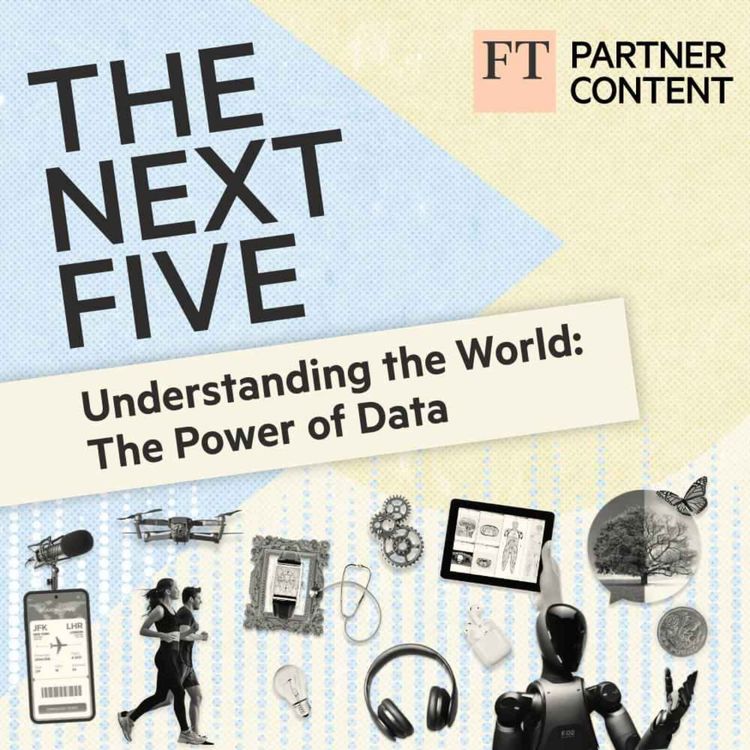
The Next Five
Understanding the World: The Power of Data
If money makes the world go round, then data tells you how fast it’s spinning and when it might stop. 90% of all data was generated in the last 2 years and every 2 years the volume of data doubles. With 11 billion devices connected to the internet today, the annual global data generation in 2025 is expected to be 181 zettabytes, that’s 181 trillion gigabytes. To put it in context, we use about 3 gigabytes to stream netflix in high definition for an hour. In other words, the modern world can’t live without data. To continue to understand the world, especially as we move ever more into the digital age of AI, we must better understand the data we are creating. And this means in every part of life, including in business. Alexander Igelsböck, Co-Founder and CEO of Adverity joins us to show how data can unlock business opportunities and create a competitive advantage. Florian Jacquier, Global Head of Data Consumer Engagement at Nestlé, discusses the importance for large global companies to see, understand and action your data correctly. Dr Clare Walsh, Director of Education at the Institute of Analytics, highlights how data is used by organisations and governments and the importance of data policy and governance.
Sources: FT Resources, Forbes, Harvard Business Review, Tyger Vilan’s Spurious Correlations, Whatsthebigdata.com
This content is paid for by Adverity and is produced in partnership with the Financial Times' Commercial Department.
More episodes
View all episodes
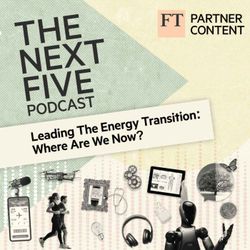
39. Leading The Energy Transition: Where Are We Now?
32:57||Ep. 39As the UN’s Secretary-General António Guterres said in July this year, “Now, we are on the cusp of a new era. Fossil fuels are running out of road. The sun is rising on a clean energy age.” Renewables and nuclear did reach an historic 40% share of global electricity generation in 2024, with renewables alone supplying roughly 32% of global power for the first time. But the length of this road and the speed we are travelling down it, will determine the success of the world’s energy transition. In this episode we explore where we are in the energy transition, the challenges, technologies and the policies. Joining Tom as guests are Elisabeth Cremona, Senior Energy Analyst for Europe at Ember, Massimo Battaini, CEO of Prysmian and María Mendiluce, CEO of We Mean Business Coalition.Sources: FT ResourcesThis content is paid for by Prysmian and is produced in partnership with the Financial Times' Commercial Department. The views and claims expressed are those of the guests alone and have not been independently verified by The Financial Times.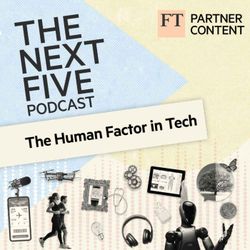
38. The Human Factor in Tech
28:25||Ep. 38The fourth industrial revolution is upon us in every way. Technologies, such as Artificial Intelligence, are growing up fast. So too must the humans that deploy and use it. Evolution is usually a slow process, yet businesses around the world must quickly reconfigure the way they work to gain the advantages that technology can afford. In this episode three experts join Tom to look at the human part of tech transformation, how we are adapting to work alongside tech such as AI, and how organisations are transforming their business operations to best adapt to the current and future needs of a tech savvy workforce. They are, Natalie Douglas, CFO at Liberty Blume, Professor Ashley Braganza, Chair in Business Transformation and Founder of Brunel University’s Centre for Artificial Intelligence and Kevin Frechette, Co-Founder and CEO of Fairmarkit.Sources: FT ResourcesThis content is paid for by Liberty Blume and is produced in partnership with the Financial Times' Commercial Department. The views and claims expressed are those of the guests alone and have not been independently verified by The Financial Times.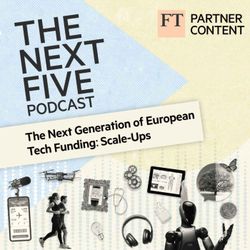
37. The Next Generation of European Tech Funding: Scale-Ups
56:45||Ep. 37Late-stage financing plays a critical role in the growth trajectory of technology scale-ups, particularly as they transition from early innovation phases to market dominance and potential exits via IPOs or acquisitions. Larger capital injections can be found from multiple avenues; VCs, private equity, corporate investors, family offices, sovereign wealth funds and growth-focused hedge funds. While the volume of capital to European growth stage companies since 2015 has tripled, there is still a funding gap and bottlenecks in Europe compared to the US.In this episode three experts discuss Europe's growth stage tech landscape, the funding available, challenges ahead and what is needed to build more billion dollar companies in Europe. They are Luca Ferrari, Co-Founder & CEO of Bending Spoons, Hilary Gosher, Managing Director at Insight Partners and Tommaso Fassati, Head of Wealth Management Italy at BNP Paribas.Sources: FT Resources, Atomico, Roland Berger, Anthropic, European Commission, Semiconductor Industry Association, Korn FerryThis content is paid for by BNP Paribas and is produced in partnership with the Financial Times' Commercial Department. The views and claims expressed are those of the guests alone and have not been independently verified by The Financial Times.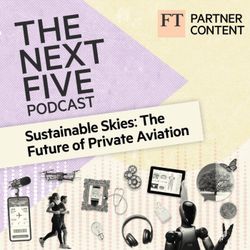
36. Sustainable Skies: The Future of Private Aviation
26:13||Ep. 36Across October 2025, 315,000 private flights departed worldwide, a 5% increase on 2024. While this is less than 1% of monthly commercial flights globally, private jet travel is still on the rise. The Covid-19 pandemic saw an increase in private travel for health reasons and with hybrid working now popular, private business travel is gaining momentum. But there are many areas the industry needs to focus on over the next five years to maintain growth. In this episode we look at the future of private aviation, exploring the trends, sustainability challenges and the technologies that could power flight in the future. I speak with Adel Mardini, CEO of Jetex a private aviation company based in Dubai with fixed-base operators and ground handling stations in over 50 locations worldwide. Alongside Adel is JoeBen Bevirt, Founder and CEO of Joby Aviation, a global leader in electric powered flight.Sources: FT Resources, Forbes, FlyAPG, Lifestyledaily.com, Nature.com, US Environment Protection Agency, UK Government, privatejetcardcomparisons.comThis content is paid for by Jetex and is produced in partnership with the Financial Times' Commercial Department. The views and claims expressed are those of the guests alone and have not been independently verified by The Financial Times.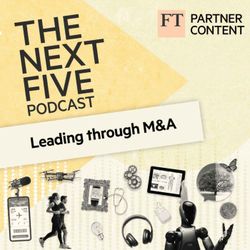
35. Leading through M&A
26:18||Ep. 35At the start of 2025 there was optimism that the global M&A market would strengthen with the expectation that inflation and interest rates would fall and a more favourable regulatory environment would exist. Yet it was a slow start amid uncertainty. The unpredictability of US trade policy under the Trump administration saw the global Economic Policy Uncertainty Index rise to a 30 year record high in early 2025, decreasing the appetite for deals. But M&A still remains a critical part of a companies growth strategy. So where will the M&A market be at the end of this year and over the next five years? And how can business leaders manage a successful M&A in today's climate and tomorrow's world? Here to discuss this further are Brian Salsberg, Snr Managing Director & Global Head of M&A at FTI Consulting and Massimo Battaini, CEO of Prysmian.Sources: FT Resources, Morrison Foerster, St.Louis Fed, McKinsey, World Uncertainty Index, JP MorganThis content is paid for by Prysmian and is produced in partnership with the Financial Times' Commercial Department. The views and claims expressed are those of the guests alone and have not been independently verified by The Financial Times.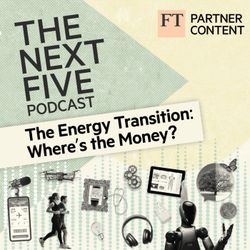
34. The Energy Transition: Where’s the Money?
42:59||Ep. 34Capital flows to the entire energy sector are set to hit $3.3tn in 2025. $2.2tn of which will find its way to renewables, nuclear, grids, storage, low-emissions fuels, efficiency and electrification. That sum is nearly twice as much as the $1.1tn going to fossil fuels this year. The transition opens up new avenues for investment, innovation, and competitiveness. But given the recent geopolitical, economic and trade climate how much will this affect future investments and value creation across the whole energy sector? Joining us today are three experts ready to discuss value creation in the energy transition, where the money is going and where it’s to be made now and in the future. They are Lars Eirik Nicolaisen, Deputy CEO of Rystad Energy, Seb Henbest, Group Head of Climate Transition at HSBC and Christian Egenhofer, Associate Senior Research Fellow at the Energy, Resources and Climate Change Unit at CEPS (Centre for European Policy Studies).Sources: FT Resources, IEA, beyondfossilfuels.org, ease-storage.eu This content is paid for by Rystad Energy and is produced in partnership with the Financial Times' Commercial Department. The views and claims expressed are those of the guests alone and have not been independently verified by The Financial Times.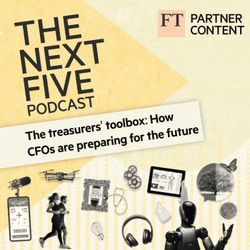
33. The Treasurers' Toolbox: How CFOs Are Preparing For The Future
25:05||Ep. 33Modern finance leaders have had to navigate turbulent waters over the last five to 10 years, buffeted by waves of geopolitical and macro market forces, rising economic nationalism, trade protectionism and environmental instability. Add that to the unprecedented pace of technological change, shifting consumer behaviours and a reimagined workforce. Here to give us insight on how CFOs are dealing with today's tough climate while preparing for the future is Kwee Juan Han, Group Executive and Group Head of Institutional Banking at DBS, Marie Myers, CFO at Hewlett Packard Enterprise and Andre Khor, Group CFO & Deputy CEO at Aster, part of the Chandra Asri Group.Sources: FT Resources, Deloitte, Forbes, ProtivitiThis content is paid for by DBS and is produced in partnership with the Financial Times' Commercial Department.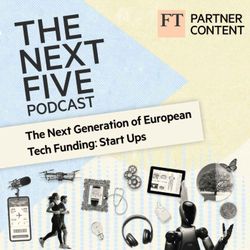
32. The Next Generation of European Tech Funding: Start Ups
33:59||Ep. 32It is no surprise that for decades the US has reigned supreme when it comes to early stage tech dealmaking. Its risk appetite, coast to coast funding options, integrated market and policy support has created a perfect environment for would-be entrepreneurs to find funding and grow their companies into global tech titans. But, there is no shortage of investable tech firms in the EU. From 2019-2024 the continent generated more high tech startups than the US every year, yet the US had four times more deal value in 2024, $209bn to Europe’s $62bn. Europe can create its own tech giants but to do so it needs to rebalance its venture funding environment to support the next generation of startups. Marie Gwenhaelle Geffroy, Head of Growth Capital & Solutions, Corporate and Institutional Banking at BNP Paribas discusses the strengths of Europe's tech industry and the role that banks play in funding the next generation of talent in Europe. Ben Blume, Partner at Atomico, highlights where European Venture funding is going, what Europe's strengths are and how we can compete with the US. Niklas Radner, Co-Founder & CEO at Nelly, gives insight into launching a tech start up in Germany, and the lessons learnt through his funding rounds.Sources: FT Resources, CEPS, KPMG, Atomico, Dealroom, Houlihan Lokey, Investment CouncilThis content is paid for by BNP Paribas and is produced in partnership with the Financial Times' Commercial Department.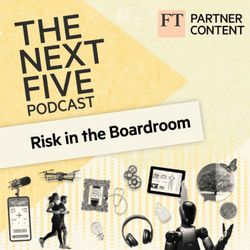
31. Risk in the Boardroom
38:02||Ep. 31The term polycrisis has been gaining traction in recent times as the world faces one disaster after another that are all interlinked. The far-reaching implications of a world at risk means boardrooms must remain agile to navigate their businesses past the rocks and into calmer seas. In a break away from our normal format, we've created our own boardroom. Sat around our virtual table today are three experts ready to discuss what risks are out there, how boards are dealing with them and what the boardroom dynamic needs to be to navigate a fast evolving and uncertain future. They are Sean McGovern, UK & Lloyd’s CEO at AXA XL, Pam Joshi, Global Head of Insurance and Risk Management at Takeda Pharmaceuticals and Sarah Isted, UK Risk Leader at PwC UK.Sources: FT Resources, IRM, GARP, ICAEWThis content is paid for by AXA XL and is produced in partnership with the Financial Times' Commercial Department.